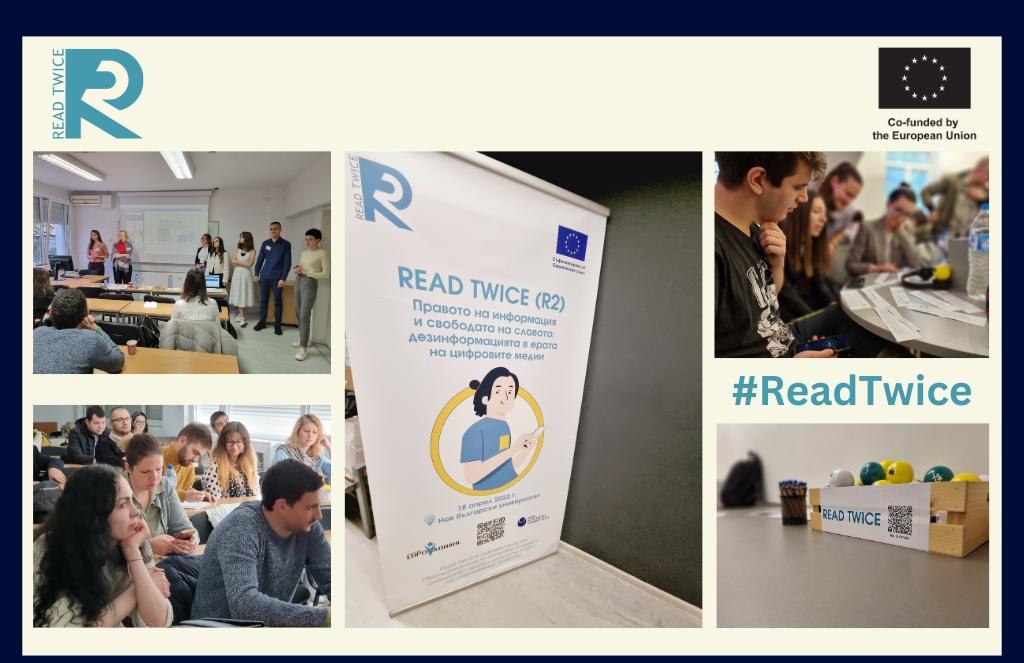Thessaloniki gets ready for its metro launch in November
The underground rapid transit lines have been under construction for almost two decades due to various project delays
 TheMayor.EU logo
TheMayor.EU logo 
An overview of the concluded university trainings under the Read Twice project in Sofia, Source: Euro Advance Association
The workshop phase of the Read Twice project in Bulgaria has ended. See what's next.
Over 130 people participated in the three student workshop trainings against fake news and disinformation in Sofia under the Read Twice project. In April and May, students and guests at New Bulgarian University, and Sofia University’s Faculty of Journalism and Mass Communication and Faculty of Philosophy “ got acquainted with various aspects of these issues and tested classic and modern tools for countering the phenomenon of disinformation in the digital space. In parallel, as part of the international project, similar trainings are held for young people in Bucharest and Zagreb.
The Read Twice (R2) project is implemented by five European partners and aims to counter disinformation and curb the spread of fake news by enhancing critical thinking and improving citizens' abilities to recognize malicious content. In its first phase, the consortium sent 30 young media professionals from Bulgaria, Romania and Croatia to capacity-building seminars against fake news and disinformation at the headquarters of project partners - the non-governmental organization Alliance4Europe in Berlin and the Lusofona University in Porto. There, they were taught by experts and got an inside look at the work of major media outlets, such as Der Spiegel, Deutsche Welle, Publico, Radio Nova.
Armed with knowledge and a new perspective on the subject, the youngsters returned to their home countries to pass on what they had learned to their peers and colleagues. Each of the partner organizations in Eastern Europe (Euro Advance Association in Sofia, Udruga Echo in Croatia and Se Poate in Romania) then had to organize three university workshops, in which young media professionals took on the role of lecturers and trainers.
Euro Advance, the project coordinator, has already successfully completed three trainings in Sofia, which were led entirely by young people and targeted other young people. The peer-to-peer learning is a method that has proven to be effective in producing lasting impact. The high levels of attendance as well as the audience enthusiasm showed that the events were valued among the target group.
Last but not least, the feedback from the events was extremely positive, with the Association and university partners reporting an increased awareness of the topics of fake news and disinformation among the workshop attendants and a better understanding of the possibilities to counter these phenomena, including in the context of European integration.
The project continues with a stakeholder seminar in Sofia in the fall, as well as with a follow-up international webinar. If you want to be informed about the upcoming activities and opportunities to participate in project events, write to us at Office@euroadvance.eu.
Read Twice is co-funded by the European Union. Views and opinions expressed are however those of the author(s) only and do not necessarily reflect those of the European Union or the European Education and Culture Executive Agency (EACEA). Neither the European Union nor EACEA can be held responsible for them.

The underground rapid transit lines have been under construction for almost two decades due to various project delays

Now you can get your wine in Talence by paying directly in Bitcoin

That’s because the state has to spend money on updating the railway infrastructure rather than subsidizing the cost of the popular pass

Rethinking renewable energy sources for the urban landscape

The examples, compiled by Beyond Fossil Fuels, can inform and inspire communities and entrepreneurs that still feel trepidation at the prospect of energy transition

Now you can get your wine in Talence by paying directly in Bitcoin

The 10th European Conference on Sustainable Cities and Towns (ESCT) sets the stage for stronger cooperation between the EU, national and local level to fast track Europe's transition to climate neutrality.

At least, that’s the promise made by the mayor of Paris, Anne Hidalgo

The underground rapid transit lines have been under construction for almost two decades due to various project delays

At least, that’s the promise made by the mayor of Paris, Anne Hidalgo

Hostal de Pinós is located in the geographical centre of the autonomous region

Despite its church-y name, the district has long been known as the hangout spot for the artsy crowds

Urban dwellers across the EU are having a say in making their surroundings friendlier to people and the environment.

Forests in the EU can help green the European construction industry and bolster a continent-wide push for architectural improvements.

Apply by 10 November and do your part for the transformation of European public spaces

An interview with the Mayor of a Polish city that seeks to reinvent itself

An interview with the newly elected ICLEI President and Mayor of Malmö

A conversation with the Mayor of Lisbon about the spirit and dimensions of innovation present in the Portuguese capital














